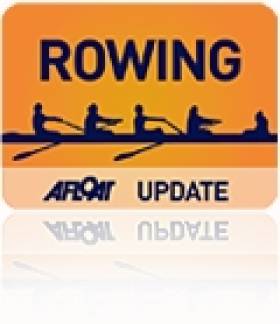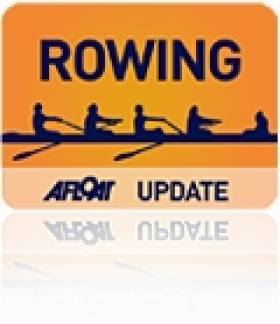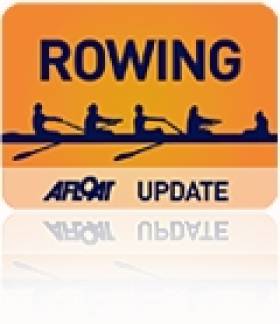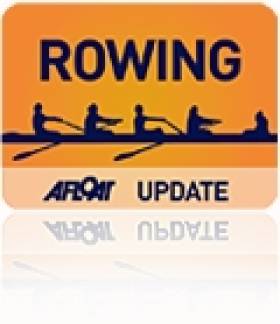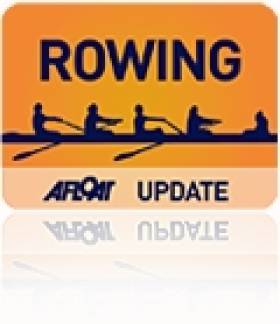Displaying items by tag: Leonora Kennedy
Kennedy and Dukarska Take Rowing Gold Again
#ROWING – Ireland's Leonora Kennedy and Monika Dukarska won gold for the second day running at the Memorial Paolo d'Aloja regatta in Piediluco in Italy. The Enniskillen/Killorglin pair have only come together as a crew in recent weeks, but again proved faster than Spain and Italy crews.
The lightweight women's double of Claire Lambe and Denise Walsh competed with the heavyweight crews and finished fifth.
The Ireland men's lightweight double missed out on the final: they raced well on Saturday evening but finished third behind South Africa, the world champions, Greece.
Memorial Paolo d'Aloja Regatta, Piediluco, (A Finals unless stated; Irish interest)
Saturday
Women
Pair: 1 Ireland (L Kennedy, M Dukarska) 7:35.74, 2 Spain 7:37.11, 3 Italy Two 7:38.79.
Lightweight Double Sculls: 1 South Africa 7:11.05, 2 Italy 7:17.41, 3 Ireland (C Lambe, D Walsh) 7:18.97.
Single Sculls: 1 Switzerland (J Gmelin) 7:56.63, 2 Greece Two (A Asoumanaki) 7:57.42, 3 Zimbabwe (M Thornycroft) 7:58.40; 4 Ireland (S Puspure) 8:01.67.
Lightweight Single Sculls: 1 Switzerland (P Merz) 7:46.88, 2 South Africa (K Johnstone) 7:49.80, 3 Switzerland Two (R Frederique) 7:20.25; 4 Ireland (S McCrohan) 7:50.35.
Saturday Heats
Men
Lightweight Double – Heat Three: 1 South Africa 6:24.87, 2 Greece 6:25.40, 3 Ireland (P O'Donovan, G O'Donovan) 6:26.49
Women
Lightweight Single Scull – Heat One: 2 McCrohan 8:17.38.
Sunday – Finals
Women
Pair: 1 Ireland (Kennedy, Dukarska) 7:31.65, 2 Spain 7:32.49, 3 Italy Two 7:35.41.
Double Sculls: 1 Lithuania (D Vistartaite, M Valciukaite) 7:01.59; 5 Ireland (Lambe, Walsh) 7:26.33.
Ireland Rowing Pair Strike Gold in Italy
#ROWING: Ireland's Leonora Kennedy and Monika Dukarska took gold on their first outing together as a pair at the Memorial Paola d'Aloja regatta in Piediluco in Italy today. They held off Spain, who took second, and four Italian crews in the final. Claire Lambe and Denise Walsh, in the lightweight double sculls, took bronze, and Siobhán McCrohan just missed out on a medal, finishing fourth in the ligthweight single sculls. Sanita Puspure, who has been ill, finished fourth in the single sculls. She has been withdrawn from the rest of the regatta.
Memorial Paolo d'Aloja Regatta, Piediluco, (A Finals unless stated; Irish interest)
Women
Pair: 1 Ireland (L Kennedy, M Dukarska) 7:35.74, 2 Spain 7:37.11, 3 Italy Two 7:38.79.
Lightweight Double Sculls: 1 South Africa 7:11.05, 2 Italy 7:17.41, 3 Ireland (C Lambe, D Walsh) 7:18.97.
Single Sculls: 1 Switzerland (J Gmelin) 7:56.63, 2 Greece Two (A Asoumanaki) 7:57.42, 3 Zimbabwe (M Thornycroft) 7:58.40; 4 Ireland (S Puspure) 8:01.67.
Lightweight Single Sculls: 1 Switzerland (P Merz) 7:46.88, 2 South Africa (K Johnstone) 7:49.80, 3 Switzerland Two (R Frederique) 7:20.25; 4 Ireland (S McCrohan) 7:50.35.
Dilleen and Kennedy Take Eighth at World Rowing Championships
#ROWING: Ireland’s Lisa Dilleen and Leonora Kennedy finished second in the B Final of the women’s pair at the World Rowing Championships in Amsterdam today, placing them eighth overall. Russia’s Liana Gorgodze and Elizaveta Tikhanova, the second slowest of the crews in the semi-finals, took this race by storm. They led all the way down the course despite constant attempts to head them by Ireland, the one crew which mounted a consistent challenge.
World Rowing Championships, Day Seven (Irish interest, selected results)
Women
Pair – B Final (Places 7 to 13): 1 Russia (L Gorgodze, E Tikhanova) 7:06.08, 2 Ireland (L Kennedy, L Dilleen) 7:09.20, 3 Serbia 7:10.61, 4 Canada 7:12.15, 5 Ukraine 7:18.40, 6 Czech Republic 7:19.72.
Kennedy and Dilleen Ease Into International Competition With Win
#ROWING: Leonora Kennedy and Lisa Dilleen won on their first outing as a pair at an international regatta this morning. The newly-formed Ireland combination came home ahead of a field of Italian crews at the Memorial Paolo d’Aloja in Piediluco in Italy. Single sculler Sanita Puspure and the Ireland double of Eimear Moran and Monika Dukarska had earlier finished second and third respectively in their finals.
Rowing Pair of Dilleen and Kennedy Make Mark at Trials
#ROWING: The newly-formed women’s pair of Lisa Dilleen and Leonora Kennedy were outstanding in racing on the final day of the Ireland Trials at the National Rowing Centre. Their percentage of projected World Championship gold medal winning time was an excellent 88.25. The new lightweight men’s pair of Mark O’Donovan and Niall Kenny and single scullers Paul O’Donovan and Sanita Puspure also breached 87 per cent. All these crews are set to represent Ireland this year.
On Saturday, in the Home International Trials, Eimantas Grigalius, the former world junior champion for Lithuania who now lives in Ireland, topped the rankings in the single sculls.
Ireland Trials, National Rowing Centre, Cork
Saturday (Home International Trials)
Men
Pair – Senior: 1 Buckley/Coughlan 7:52.57 (74.06), 2 Rawlinson/Brett 7:53.86 (73.86), 3 Deere/Corcoran 7:57.32 (73.33).
Lightweight Pair: Keene/Breen 7:48.69 (74.68), 2 Murphy/McKenna 7:49.77 (74.5)
Junior Pair: 1 Browne/O’Connor 7:54.10 (73.82), 2 Higgins/Higgins 7:55.62 (73.59), 3 Coyne/McCarthy 7:57.33 (73.32).
Single Sculls – Senior: 1 E Grigalius 7:51.56 (78.46), 2 D Neale 7:59.09 (77.23), 3 S McKeown 8:04.84 (76.31).
Lightweight Single Sculls – Senior: N Duncan 8:21.96 (75.70), 2 C Murphy 8:41.5 (72.78), 3 S Toland 8:49.20 (71.81)
Junior Single Scull: 1 D Synott 8:04.76 (76.33), 2 S Dennehy 8:11.55 (75.27), 3 S O’Sullivan 8:12.87 (75.07).
Women
Pair - Senior: 1 Lonergan/Ryan 8:47.30 (73.58), 2 O’Brien/McCarthy 8:48.73 (73.38), 3 Bracken/Kelly 8:59.77 (71.88).
Lightweight Pair – Senior: 1 Leahy/Crowe 8:36.85 (77.78), 2 Wickham/Judge 8:51.01 (75.70).
Junior Pair: Connor/Hickey 8:44.08 (74.03), 2 Davis/O’Dwyer 8:51.97 (72.94), 3 O’Keeffe/Nagle 8:55.28 (72.49).
Lightweight Single Sculls – Senior: 1 E Desmond 9:18.30 (74.87), 2 O Holden 9:40.27 (72.04), 3 A Bulman 9:43.64 (71.62).
Junior Single Scull: 1 A Rodger 9:03.29 (73.99), 2 S Murphy 9:03.99 (73.9), 3 M McLaughlin 9:05.29 (73.72).
Sunday
(Per Centages Based On Senior Times)
Race One: 1 B Keohane, D Keohane (junior pair) 7:34.12 (81.04), 2 P O’Donovan (lightweight single, under-23) 7:37.78 (87.38), 3 L Kennedy, L Dilleen (women’s senior pair) 7:40.89 (88.25), 4 O Hayes, C Jennings (women’s lightweight double) 7:51.38 (85.71).
Race Two: 1 S Dolan (women’s lightweight single) 8:50.00 (83.02), S Horgan (women’s lightweight single, under-23) 8:51.63 (82.76), 3 E Barry (jun women’s single) 8:52.99 (79.74), 4 E Hegarty (jun women’s single) 9:06.59 (77.75)
Race Three: 1 J Ryan (lightweight single) 7:53.65 (84.45), 2 Women’s Junior Double (J English, E Lambe) 8:02.67 (81.63), 3 S Puspure (women’s single) 8:05.73 (87.5), 4 Women’s Junior Double (O’Keeffe) 8:16.75 (79.32).
Race Four: 1 Lightweight Pair (M O’Donovan, N Kenny) 7:15.87 (87.18), 2 Women’s Four (M O’Neill, E Tormey, B O’Brien, A Keogh) 7:31.87 (84.09), 3 D Neale (men’s single) 7:56.54 (81.84), 4 J Keohane (men’s single) 7:59.85 (81.28).
Race Five: 1 Men’s Double (S McKeown, D Quinlan) 7:12.90 (82.93), 2 Men’s Double (Oliver) 7:17.73 (82.01), 3 Men’s Pair (R O’Callaghan, R Bennett) 7:28.26 (82.10), 4 Men’s Pair (K Neville, M Pukelis) 7:31.51 (81.5).
Race Six: 1 Junior Quadruple (Begley) 6:58.49 (79.09), 2 Lightweight Double (C Beck) 7:11.04 (84.91), 3 Junior Double (D O’Malley, C Carmody) 7:12.49 (83.01), 4 Junior Double (Mulvaney) 7:19.14 (81.75).
Race Seven (Pararowing Crews, 1,000m): 1 LTA1x (O’Hara) 2:09.42 (77.27), 2 TA1x (O’Brien) 2:45.40 (81.62), 3 AS1x (O’Doherty) 2:48.06 (81.82), 4 AS1x (Kelly) 3:09.52 (72.55).


























